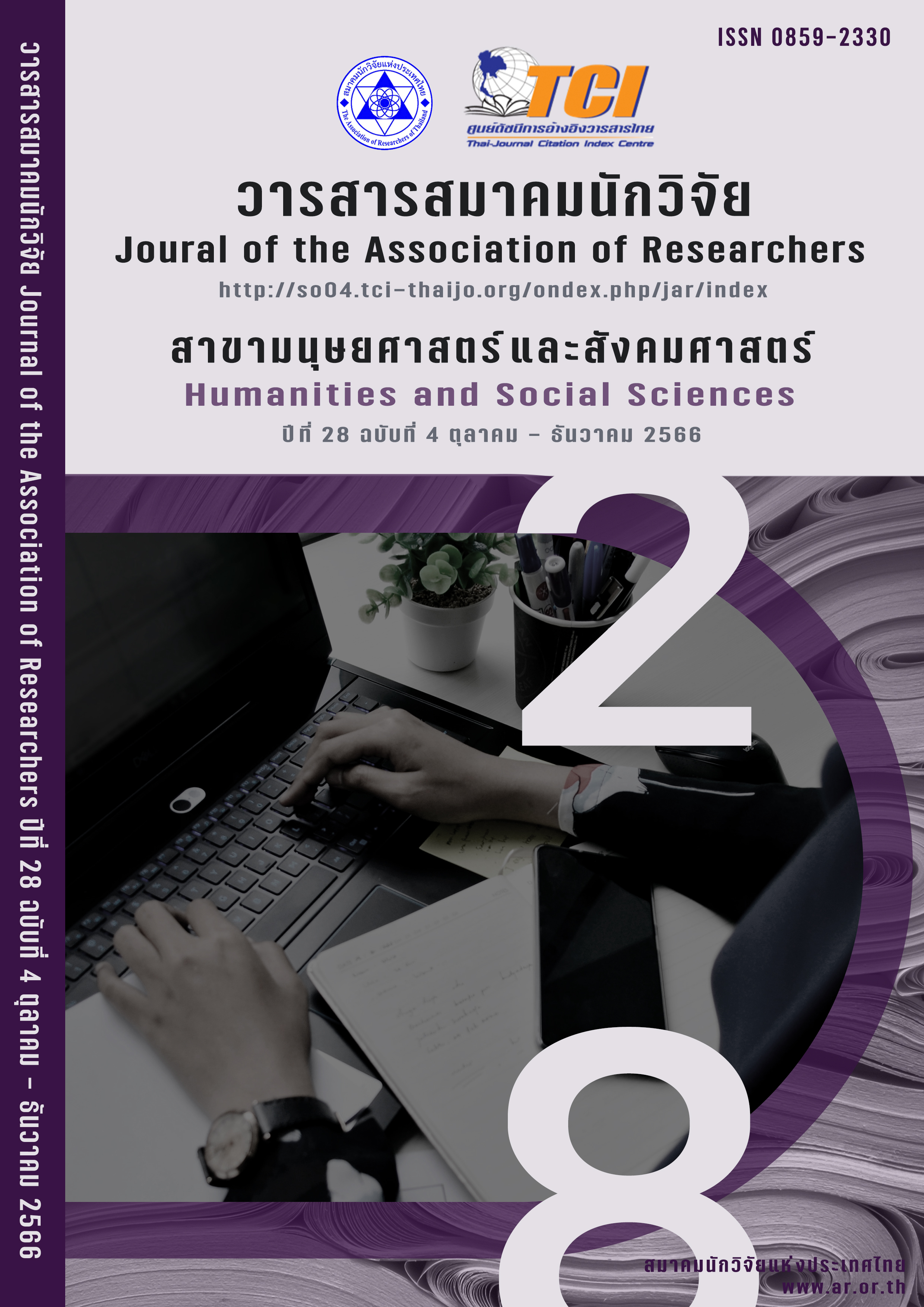Application of artificial intelligence in financial management in Thailand
Main Article Content
Abstract
This research article has the objective To study the application of Artificial Intelligence in smart city local administration. The study was used by qualitative research by reviewing the literature. From articles published in the database There were interviews with those involved. There is 1 executive and 4 Officer. ) private corporations and technology entrepreneurs, a total of 15 people. The research results found that local government organizations are continuously adapting and developing. along with having to change the way of thinking to be people-centered and the way of working To objective to be a modern organization that works proactively, integrated, agile, fast, and highly efficient. Applying an electronic document system can save time in receiving and delivering documents. This eliminates the need to keep paper documents and put them in a file. No need to store in a cabinet. Application of participatory Artificial Intelligence systems to the public sector You can receive news about Local government organizations work, report safety incidents, make complaints, and present problems. Sharing area Asking for help. Image of Artificial Intelligence used in smart cities A case study of keyword research using and combining keywords such as Artificial Intelligence , Machine Learning, Internet of Things, Smart Healthcare, Smart City/Smart Cities, Smart Education, Smart Infrastructure, Smart Living, Smart Security and Smart. Good governance Adoption of artificial intelligence in smart cities. The study draws implications to offer to startups in the local district.
Article Details

This work is licensed under a Creative Commons Attribution-NonCommercial-NoDerivatives 4.0 International License.
บทความที่ปรากฏในวารสารนี้ เป็นความรับผิดชอบของผู้เขียน ซึ่งสมาคมนักวิจัยไม่จำเป็นต้องเห็นด้วยเสมอไป การนำเสนอผลงานวิจัยและบทความในวารสารนี้ไปเผยแพร่สามารถกระทำได้ โดยระบุแหล่งอ้างอิงจาก "วารสารสมาคมนักวิจัย"
References
จักรกฤษกมุทมาศ. (2564). แนวโน้มของการประยุกต์ใช้เทคโนโลยีดิจิทัลสําหรับการบริหารงานองค์กรปกครองส่วนท้องถิ่น: กรณีศึกษาเทศบาลในพื้นที่ขอนแก่นเมืองอัจฉริยะ, วารสารบริหารธุรกิจและการบัญชีมหาวิทยาลัยขอนแก่น, 6 (3), 77-101.
สกนธ์ วรัญญูวัฒนา. (มปป.). การบริหารการเงินการคลังองค์กรปกครองส่วนท้องถิ่นอย่างมืออาชีพ, เอกสารการบรรยาย.
ชวโรจน์ เกียรติกําพล. (2562). ปัญญาประดิษฐ์กับการแพทย์. HealthToday -January 2022.
ภาวิณีลักขษรและกฤชวรรธน์โล่ห์วัชรินทร์. (2562). เงื่อนไขการเกิดนวัตกรรมขององค์กรปกครองส่วนท้องถิ่นในประเทศไทย. วารสารรัฐศาสตร์และรัฐประศาสนศาสตร์,10(2),109-126.
ดิเรกปัทมสิริวัฒน์. (2553). นโยบายการคลังสาธารณะ, (พิมพ์ครั้งที่1), กรุงเทพฯ: แปลนพริ้นติ้ง.
รายงานศึกษาการบริหารจัดการการคลังสาธารณะของประเทศไทย: รายงานศึกษาฉบับที่ 3 ความสัมพันธ์ระหว่างส่วนกลางและท้องถิ่น (67486 v2) (เอกสารธนาคารโลกแปลจากต้นฉบับภาษาอังกฤษ), 2554.
ศิโรตม์ ภาคสุวรรณ. (2564). บทบาทของประเทศไทยในการพัฒนาปัญญาประดิษฐ์. วารสารรปรัชญาปริทรรศน์, 26(1), 135-145.
Cellary, W. (2013). Smart governance for smart industries. Proceedings of the 7th International Conference on theory and practice of electronic governance, (2013), 91-93.
Dormehl, L. (2017). Thinking Machines: The Quest for Artificial Intelligence and Where It’s Taking Us Next(New York: Penguin–Tarcher Perigee).
Gil-Garcia et al., (2014). Being smart: Emerging technologies and innovation in the public sector Government information quarterly, 31 (2014), I1-I8.
H.M.K.K.M.B. Herath, Mamta Mittal. (2022). Adoption of artificial intelligence in smart cities: A comprehensive review, International Journal of Information Management Data Insights, 2(1), 1-21. https://doi.org/10.1016/j.jjimei.2022.100076.
Hussein, A. (2009). The use of triangulation in social sciences research: Can qualitativeand quantitative methods be combined? Journal of Comparative Social Work, 1, 1-12.
Hanjaithai T., (2017). Local Administration’s Authority in Producing Electricity from Wastes: A Comparative Study between Thailand and Japan, Kasem Bundit Journal, 18(1),120-134.
Kumar et al. (2020). Distributed energy resources and the application of AI, IoT, and blockchain in smart grids Energies, 13(21), (2020), 5739.
Lawton, A. & Macaulay, M. (2014). Localism in practice: Investigating citizen participationand good governance in local government standards of conduct. Public Administration Review, 74(1), 75-83.
Lu et al.. (2020). A reinforcement learning-based decision system for electricity pricing plan selection by smart grid end user IEEE Transactions on Smart Grid, 12(3)(2020), 2176-2187.
Nishishiba, M., Jones, M. & Kraner, M. (2014). Research methods and statistics for publicand nonprofit administrators. California: Sage Publications.
Panagiotis T.Nastos. (2021). Review article: Risk management framework of environmental hazards and extremes in Mediterranean ecosystems, Natural Hazards and Earth System Science21(6):1935-1954 DOI:10.5194/nhess-21-1935-2021.
Patmasiriwat,D. (2010). Public Finance Policy, (1st edition), Bangkok: Plan Printing.
Putsam S, et al.. (2023). Roles of local government administration in mental health promotion and prevention in Thailand, Journal of Mental Health of Thailand 2023, 31(2), 142-150.
Office of the Permanent Secretary, Ministry of Interior. (2021). Human resource management plan, office Permanent Secretary of the Ministry of Interior 2017-2021. Retrieved on 3 March 2021 from http://www.personnel.moi.go.th/manpower/2560/hrmplan.pdf.
Shubhendu &Vijay. (2013). “Applicability of Artificial Intelligence in Different Fields of Life.” https://api.semanticscholar.org/CorpusID:17375808.
Zhou M, et al. (2020). Progress in Neural NLP: Modeling, Le arning, and Reasoning,Engineering, 6(3), 275-290.
Translate Thai Reference
Kamudhamas J. ( 2022). Tendencies Toward the Application of Digital Technology for Administration in the Local Administrative Organizations: The Case Study of the Municipalities in Khon Kaen Smart City Area, KKBS Journal of Business Administration and Accountancy, 6 (3), 77-101.
Janthep A. (2022). Public-Private Partnership in the Provision of Public Services: A Case Study of the Development of Light Rail Transit in Khon Kaen, Journal of Politics and Governance,12(2), 74-97.
LakkhasornP. & Lohwatcharin.K. (2019). Conditions for innovation. of the administrative organizationLocal in Thailand. Journal of Political Science and Public Administration, 10(2), 109-126.
Phaksuwan S. (2021). The Role of Thailand in Developing the Artificial Intellectual. Journal of Philosophical Vision, 26(1), 135-145.
Waranyuwatana S. (nd.). Professional financial management of local government organizations, lecture documents.


